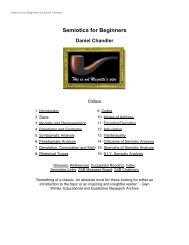Semiotics for Beginners by Daniel Chandler
Semiotics for Beginners by Daniel Chandler
Semiotics for Beginners by Daniel Chandler
Create successful ePaper yourself
Turn your PDF publications into a flip-book with our unique Google optimized e-Paper software.
<strong>Semiotics</strong> <strong>for</strong> <strong>Beginners</strong> <strong>by</strong> <strong>Daniel</strong> <strong>Chandler</strong><br />
It's a beautiful thing, the destruction of words. Of course the great wastage is in the verbs and<br />
adjectives... It isn't only the synonyms: there are also the antonyms. After all, what justification<br />
is there <strong>for</strong> a word which is simply the opposite of some other word? A word contains its<br />
opposite in itself. Take 'good', <strong>for</strong> instance. If you have a word like 'good', what need is there<br />
<strong>for</strong> a word like 'bad'? 'Ungood' will do just as well - better, because it's an exact opposite, which<br />
the other is not. (Orwell 1989, 54).<br />
John Lyons suggests that the reason why we tend to use morphologically unrelated <strong>for</strong>ms in<br />
comparative oppositions is to emphasize the semantic distinction involved: '"good" and "bad" are<br />
more obviously different lexemes than "friendly" and "unfriendly"' (Lyons 1977, 277). He adds that<br />
'gradable opposites manifest the property of polarity more strikingly than do other opposites' (ibid.,<br />
279). Furthermore, in everyday discourse we frequently treat comparative terms as if they were<br />
discrete categories (ibid., 278). For whatever reasons we seem to favour categorization which is<br />
'black and white'.<br />
It is a feature of culture that binary oppositions come to seem 'natural' to members of a culture. Many<br />
pairings of concepts (such as male/female and mind/body) are familiar to members of a culture and<br />
may seem commonsensical distinctions <strong>for</strong> everyday communicational purposes even if they may be<br />
regarded as 'false dichotomies' in critical contexts. Rudyard Kipling satirized the apparently universal<br />
tendency to divide the people we know directly or indirectly into 'Us' and 'Them' ('We and They',<br />
Kipling 1977, 289-290):<br />
All nice people, like us, are We<br />
And everyone else is They:<br />
But if you cross over the sea,<br />
Instead of over the way,<br />
You may end <strong>by</strong> (think of it!)<br />
Looking on We<br />
As only a sort of They!<br />
The opposition of self/other (or subject/object) is psychologically fundamental. The neo-Freudian<br />
psychoanalyst Jacques Lacan wrote in 1957 (in 'The Insistence of the Letter in the Unconscious') that<br />
'the unconscious is structured like a language' (cf. Lacan 1977, 159, 298). The mind imposes some<br />
degree of constancy on the dynamic flux of experience <strong>by</strong> defining 'the Self' in relation to 'the Other'.<br />
Initially, in the primal realm of 'the Real' (where there is no absence, loss or lack), the infant has no<br />
centre of identity and experiences no clear boundaries between itself and<br />
the external world.<br />
The child emerges from the Real and enters 'the Imaginary' at the age of<br />
about six- to eighteen-months, be<strong>for</strong>e the acquisition of speech. This is a<br />
private psychic realm in which the construction of the Self as subject is<br />
initiated. In the realm of visual images, we find our sense of self reflected<br />
back <strong>by</strong> an Other with whom we identify. For Lacan, this does not reflect a<br />
dichotomy between Self and Other, because not only is Self always<br />
defined in terms of Other, but paradoxically, Self is Other. He describes a<br />
defining moment in the Imaginary which he calls 'the mirror phase', when<br />
seeing one's mirror image (and being told <strong>by</strong> one's mother, 'That's you!')




